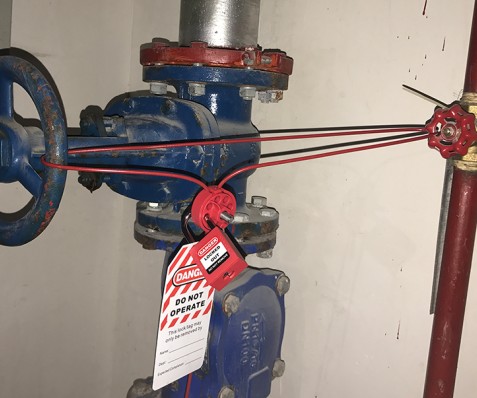Because the moving parts of
mechanical equipment are not effectively isolated, the production safety
accidents of casualties caused by people entering dangerous areas being
squeezed by the activated equipment often occur. For example, in July
2021, a worker in a Shanghai company violated the operation
instructions, opened the protective door without authorization, entered
the glass temporary storage rack of the assembly line to adjust the
position of the glass, and was crushed to death by the moving loader
support.
In
this case, the employee first opened the protective door of the glass
shelf before entering it. It can be seen from this point that the risk
of mobile devices in the glass shelf has been previously identified, and
a protective door is used to isolate and protect this risk area. So,
how should the protective door be set up? First of all, protective
devices can be divided into fixed protective devices and mobile
protective devices. Fixed protective devices should be fixed in a
certain manner (e.g. by screws, nuts, welding) and can only be opened or
removed by means of tools or by breaking the fixing method. Movable
guards can be opened without the use of tools, but when opened, they
should be fixed to the machine or its structure as far as possible and
should be interlocked (with protective locks if necessary). Therefore,
the protective door in the accident can not be identified as a
protective device, or can not play the role of protective device.
The installation of effective protective devices can prevent employees from entering the hazardous area unintentionally, but it does not mean that the source of danger and the personnel have been completely separated. In many cases, employees need to purposefully enter hazardous areas to handle production anomalies and repair operations. In this case, it is particularly important to introduce the practice of energy isolation and strictly implement it. This is also an important risk control measure that many enterprises are implementing, such as the common Lockout/Tagout system. Different companies have different interpretations of locking tags, some are called LOTO, which means lock out, tag out; Also known as LTCT, lock, Tag, Clean, test. In GB/T 33579-2017 Machine Safety Hazard Energy Control Method Locking Tag, Lockout/Tagout is defined as placing a lock/tag on the energy isolation device in accordance with the established procedure to indicate that the energy isolation device shall not be operated until removed in accordance with the established procedure.

Lockout/Tagout is allowed to be used independently in the NATIONAL standard, but in practice, the tag can be used independently in some specific occasions, such as unplugging a device and placing it within one meter of the side. In most cases, locking and taging should be used together. However, different jobs have different risks and conditions, some lead to small consequences, some can be fatal, some can isolate power sources, and some need to isolate gravitational potential energy.
In my work practice, often also have problems with the production department colleagues about energy isolation, such as using a homemade stop cushion below the push up the equipment to prevent falling line not line, power locks on line not line, there is no way to test to start the equipment from a process according to control procedures in a stop condition on the wheel removed a clutter of line not line, and so on all kinds of problems, Therefore, instead of thinking about one problem after another, I think it is better to design a systematic method to solve such problems so that front-line personnel can independently conduct risk analysis and formulate preventive measures. For this purpose, I compiled a seven-step method for identifying energy isolation methods according to the relevant machine safety standards and some factory practices, and introduced and applied it step by step by referring to the injury accidents mentioned above.